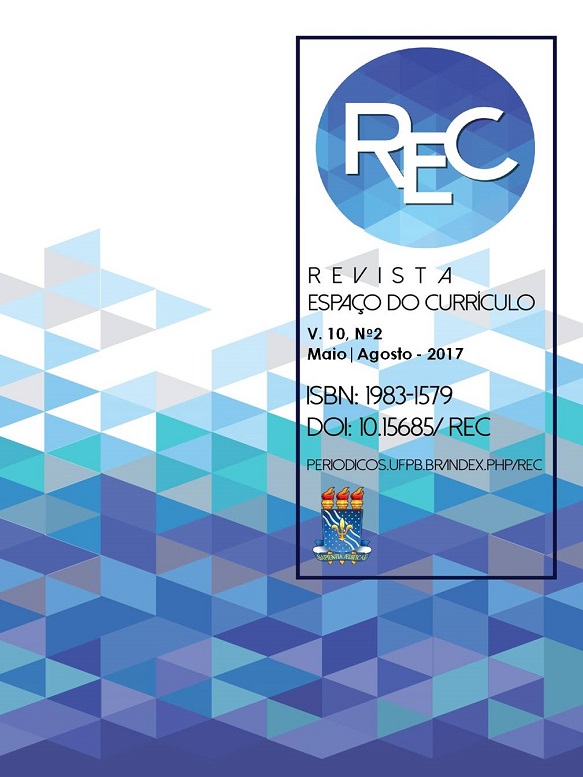From Teaching as the pedagogue's identity and the different professional attributions proposed by DCNP -2006
DOI:
https://doi.org/10.15687/rec.v10i2.35474Keywords:
Professional knowledge. Pedagogy. National Curriculum Guidelines for the Pedagogical CourseAbstract
The great problems that have accumulated in relation to the Pedagogy curriculum are notorious, since there is a lot of disagreement among educators about the possibilities of professional performance that can be attributed to the pedagogue. In this context, this study seeks to analyze, based on the narratives of the students (8th semester students), the professional knowledge and the different qualifications proposed by DCNP 2006 in the Pedagogy course. Especially the works of Pimenta (1998; 2002, 2004), Libâneo (2000; 2006; 2010) and Franco (2008; 2011) were used, which denounce, in their research, the problem surrounding a fragmented curriculum in various qualifications and the defense of Pedagogy as the basis for the education and professional performance of the pedagogue, as opposed to the recommendations emphasized by the DCNP that place teaching as the basis of training. The research was exploratory and anchored in the qualitative approach, which allowed a more adequate knowledge of the reality instituted through the acts of curricula of undergraduate students (graduating students), in view of the construction of their identity as pedagogues. We concluded in this study that: a) the workload of 3,200 hours is insufficient to form profiles of different professionals in a single course; b) insufficient professional knowledge for the Pedagogue's performance in different spaces, as provided by the DCNP; d) the knowledge linked to teaching methodologies in the course is also fragile, which reverberates in the professional insecurity of future pedagogues in teaching content mainly in the areas of Portuguese and mathematics.
Downloads
Metrics
References
BRASIL. Resolução CNE/CP n. 1 de 15 de maio de 2006. Institui Diretrizes Curriculares para o Curso de Graduação em Pedagogia, licenciatura. Disponível em: <http://portal.mec.gov.br/index.php?option=com_content&id= 12991:diretrizes-curriculares-cursos-de-graduacao>. Acesso em: jan. 2012.
______. MEC/INEP. Censo da Educação Superior 2010: análise crítica dos resultados para a tomada de decisões estratégicas. Disponível em: http://portal.mec.gov.br/index.php?option=com_content&view=article&id=1721>. Acesso em: 13 jan. 2014
BISSOLLI DA SILVA, Carmem Silvia. Curso de Pedagogia no Brasil: história e identidade. Campinas: Autores Associados, 1999. (Polêmicas do nosso tempo, 66).
EVANGELISTA, O. TRICHES, J. Diretrizes curriculares nacional para o curso de Pedagogia: docência, gestão e pesquisa. VII Semana de Pesquisa em Educação da Região Sul. Disponível em: <http://www.portalanpedsul.com.br/dmin/uploads/2008/Politicas_publicas_e_Gestao_educacional/Trabalho/07_22_29_DIRETR~1.PDF, 2008>. Acesso em: 17 ago. 2014.
FRANCO, Maria Amélia. Pedagogia como ciência da educação. Campinas. Papirus. 2003
FRANCO, LIBÂNEO, José Carlos; PIMENTA Selma Garrido. As dimensões constitutivas da Pedagogia como campo de conhecimento. Revista Educação em foco. Ano 14 - n. 17 - julho 2011 - p. 55-78.
HARGREAVES, Andy. Hacia uma geografia social de la formación docente. In: RASCO, J.F. Angulo, RUIZ, J. Barquín, GÓMEZ, A. I. Pérez. Desarrolo profesional del docente: Política, investigación y práctica.
LIBÂNEO, J. C. ______. Que destino os educadores darão a Pedagogia. In: LIBÂNEO, J. C. Pedagogia e Pedagogos para que? São Paulo: Cortez, 3ª edição, 2000.
_________Pedagogia e Pedagogos: inquietações e buscas. Revista Educar, Curitiba, n. 17, p. 153-176. Editora da UFPR. 2001.
________. Diretrizes curriculares da Pedagogia: um adeus à Pedagogia e aos Pedagogos? Novas subjetividades, currículos, docência e questões pedagógicas na perspectiva da inclusão social. Encontro Nacional de Didática e Prática de Ensino. Recife: ENDIPE, 2006 a, p. 213- 242.
_______. Diretrizes curriculares da pedagogia: imprecisões teóricas e concepção estreita da formação profissional de educadores. Revista Educação e Sociedade, Campinas, vol. 27, n. 96 - Especial, p. 843-876, out. 2006b. Disponível em: <http://www.cedes.unicamp.br>. Acesso em: 12 de janeiro de 2015
__________O ensino da Didática, das metodologias específicas e dos conteúdos específicos do ensino fundamental nos currículos dos cursos de Pedagogia. Revista brasileira de Estudos Pedagógico, Brasília, v. 91, n. 229, p. 562-583, set./dez. 2010
MASCARENHAS, Aline Daiane Nunes. Formação de pedagogos e identidade profissional: tensões sobre a diversidade de habilitações profissionais. 192 f. il. 2015. Tese (Doutorado) – Faculdade de Educação, Universidade Federal da Bahia, Salvador, 2015.
PIMENTA, S. G. (Org.). Saberes pedagógicos e atividade docente. São Paulo: Cortez, 1999.
______. A prática (e a teoria) docente re-significando a Didática. In: OLIVEIRA (Org) Confluências e divergências entre Didática e Currículo. Campinas: Papirus, p. 153-176, 1998.
_______. De professores, pesquisa e didática. Campinas: Papirus, 2002.
_______. “Prefácio”. In: LIBÂNEO, José C. Pedagogia e Pedagogos, para quê? São Paulo: Cortez, 1998.
_______. Pedagogia: sobre Diretrizes Curriculares. Fórum Nacional de Pedagogia 2004, realizado em Belo Horizonte, julho de 2004. Disponível em: <http://gie.cespe.unb.br/moodle/Videos/CursoPAS/Pedagogia_Diretrizes_Selma_Garrido_Pimenta.pdf>. Acesso em: 10 fev. 2014.
PINTO, Umberto A. O Pedagogo escolar: avançando no debate a partir de experiência nos cursos de Complementação Pedagógica. In: PIMENTA, S.G. (org) Pedagogia e pedagogos: caminhos e perspectivas. São Paulo. Cortez Ed. 2002.
TARDIF, M. Saberes docentes e formação profissional. Petrópolis, RJ: Vozes, 2002.
SHULMAN, Lee S. Knowledge and teaching: foundations of the new reform. Harvard Educational Review, v. 57, n. 1, p. 1-22, Feb. 1987.
Downloads
Published
How to Cite
Issue
Section
License
By submitting an article to Curriculum Space Journal (CSJ) and having it approved, the authors agree to assign, without remuneration, the following rights to Curriculum Space Journal: first publication rights and permission for CSJ to redistribute this article. article and its metadata to the indexing and reference services that its editors deem appropriate.
















